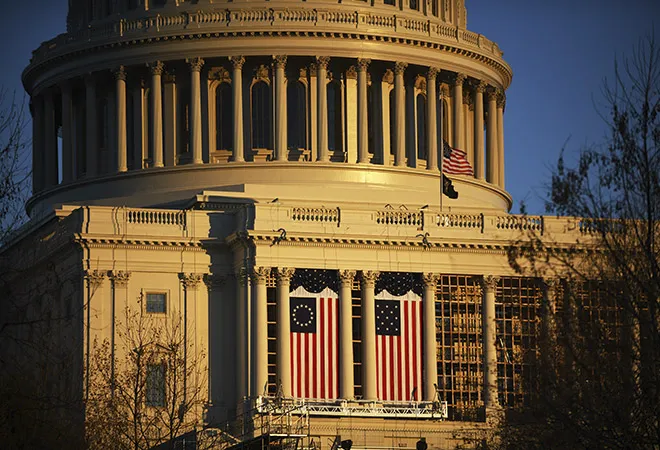-
CENTRES
Progammes & Centres
Location

The US is facing a seemingly contradicted challenge-to protect domestic average families and to promote an open trade globally. The Trump administration intends to destroy the global trade order to create more domestic jobs and win over voters. But this cannot tackle its domestic challenges. Because the underlying challenge for the US is social inequality. The US example is a lesson for the world on the importance of maintaining economic development and social equality.
In the 1990s, the most valuable companies were Japanese firms, such as Bank of Mitsubishi, Sumitomo Mitsui Bank, Industrial Bank, Fuji Bank and Dai-Ichi Kangyo Bank, NTT DoCoMo and Toyota. These have now been replaced by US companies, such as Apple, Amazon, Microsoft, Google, Facebook, Berkshire Hathaway, Visa, Mastercard, J.P. Morgan, Johnson & Johnson, Walmart and P&G. The total market value of these US companies is more than $11,098 billion (market values on August 28th, 2020), approximately equivalent to the sum of (about $11,389.5 billion) German, UK, French and Italian’s GDP in 2019, or saying about 52% of US GDP (about $21427.7 billion, in 2019). Just a few of most valuable companies are non-US, for example, Alibaba, Tencent, TSMC, Nestle and Roche.
All these firms have benefitted from hyper-globalisation. For instance, Microsoft’s revenue increased 343.66 percent from US$28.3 billion in 2002 to US$125.8 billion in 2019, of which the share of its global income increased from 26.5 percent (US$7.5 billion) in 2002 to 48.98 percent (US$61.64 billion) in 2019. Similarly, Apple’s turnover increased 44.63 times from US$5.7 billion in 2002 to US$260.1 billion in 2019. Its global income also increased from 43 percent (US$2.47 billion) in 2002 to 60.69 percent (US$157.9 billion) in 2019.
At the same time, US per capital disposable personal income increased 76.76 percent (from US$28,153 in 2002 to US$49,763 in 2019), and consequently, the gap between the rich and the poor in the US has widened. How does China compare? The urban residents per capital disposable personal income in China increased by 298.98 percent, from about US$1,122 in 2002 to about US$4,477 in 2019. The population of China is 1.4 billion and over 100 million people live under the Chinese standard of poverty just 8 years ago. But now China is making some progress to curtail inequality. For instance, Hong Shan village in Western China is already equipped with a high-speed train, 5G network, data center and cloud computing, unmanned aerial vehicles (for fertilization purposes), internet of things (to remote monitor the temperature and humidity of the soil and plant, and track each fruit) and e-business infrastructure (to sell the products). The annual per capital income of Hong Shan is about US$2,900. This may not be high, but it is on the right track.
The Trump administration has imposed sanctions on several global companies (including Chinese firms), it has upended the global order, it has threatened to impose taxes on US multi-national companies, it has pushed the Federal Reserve to keep interest rates low and has suppressed domestic efforts against COVID-19. Unfortunately, this cannot protect the jobs or improve lives for average US family in the long term. On one hand, we cannot deny hyper-globalization decreases the living costs for the US average families, opens more doors for the US SMEs and attracts more global talents to the US. On the other hand, even if Apple were to move its factories to the US, can the country construct the required supply chain? No, because it lacks the necessary skilled labour and high cost-effective components. If Microsoft brings the jobs back to the US, are they competitive to gain the deals? No, because they will need talented engineers and to keep close to the most profitable clients. If the US buys 5G equipment from Nokia, Ericsson or Samsung, can it improve its national competitiveness? Yes, but it will have to pay higher costs, which will delay the national digitalisation process and provide unstable signals for the users.
What should the US government do instead? It should invest in revolutionary technologies and train more people for the necessary skills. It should provide subsidies (for education or healthcare) for low-income families. Scientific suggestions (for instance, from the US Centers for Disease Control and Prevention and the World Health Organization) must be respected during the pandemic. High cost-effective traditional and ICT infrastructure must be provided to attract global talent. This would encourage families to formulate stronger consumption power for the domestic market. Unfortunately, neither Democratic presidential hopeful Joe Biden nor US President Donald Trump will do this. Domestic capitalists will resist such state-led campaigns for social equality as they will worry about their losses. For example, climate change or public health could cost more than thousand billion dollars and it potentially increases the governmental debt or triggers the systematic financial risks. Conversely, the financial and technological giants are the beneficiaries of global and domestic conflicts. For example, Facebook could take more market shares from the absence of TikTok; Healthcare companies could against universal healthcare proposals; let alone the military and energy giants and they are always winners during the crisis in the history. It is not a high chance to see a change in the US in the short term, either Biden or Trump taking the White House. The interests of the average US family will be sacrificed, even though it seems that politicians are fighting for them. Also, US protectionism strategies weakens the global trusts and capabilities against the urgent common challenges, for instance, making the people in less development countries conveniently access to the vaccine and the concerted actions to fight the pandemic, climate change, food crisis, ecological degradation and digital security.
The key is to eliminate social inequality rather than simply transferring global attentions abroad, such as ruining the global trade order. But the chances of this happening in the US are slim. This is a lesson for all countries. Even though economic development is a priority, society will be punished without equality. Global challenges will intensify domestic conflicts. Good governances (for instance, combining digital technology, ecology and public health) is needed for all cities and countries. The national governments will have a pivotal role in promoting and maintaining equality.
“Drain the swamp” is the motto in the US Republic National Congress in 2020. From 19th century to 1970s, it is widely accepted by the US society to drain the swamp in order to clear the mosquito or construct the highway. It is pretty long time for the public, law makers and enforcers, and scientists realized the values of wetlands ecosystem services. For example, habitats of fish or birds, clean the water, weaken the floods and storage the fresh water, landscape. The swamps are legally protected after the Clean Water Act in 1970s. If we need to spend such a longer time to realize the necessities that great powers collaboration globally and maintaining social equality domestically, the US, China and the world will be swamped.
The views expressed above belong to the author(s). ORF research and analyses now available on Telegram! Click here to access our curated content — blogs, longforms and interviews.

Chen Xi is an expert on geo-tech competition smart city and ICT corporation strategy. He is the founder of Harbor Overseas a global smart-city consulting ...
Read More +